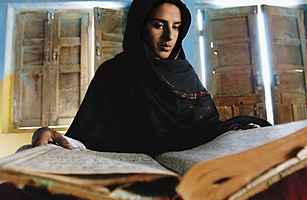
Only a few leaders are alchemists who take the worst of human behavior and turn it into the best. Mukhtaran Bibi, a Pakistani woman raised in poverty and illiteracy, has responded to the violence and gender apartheid directed at her and other women with an insistence on justice and education. Her tragedy began in 2002 when her brother was accused of walking with a girl from a higher tribal group. In a culture in which female bodies are battlegrounds for male honor, the village court ruled that he be punished with the rape of his sister. Bibi was assaulted by four men and paraded naked through the village.
There are perhaps thousands of such "honor crimes" in Pakistan each year. Survivors are more likely to kill themselves or be killed by their families than turn to a legal system that requires four male adult Muslim eyewitnesses to testify to rape—otherwise the victim can be convicted of fornication and adultery. But Bibi went to court. Her bravery attracted support from international media and women's groups, and her attackers were convicted. With the compensation money plus contributions from people who read about her struggle, she created a girls' school. Now 33, she has become a skilled organizer and trusted leader, and a magnet for other women escaping violence.
But Bibi is far from safe. Only global pressure forced Pakistan to give her a passport so she could meet women abroad, and she still receives death threats from those who view her as a danger to the nation's image and social order. Like Nelson Mandela, another alchemist who redeemed human nature by example, she depends on ordinary supporters to keep herself and her work alive.
Steinem is a writer, an activist and adviser to women's rights group Equality Now